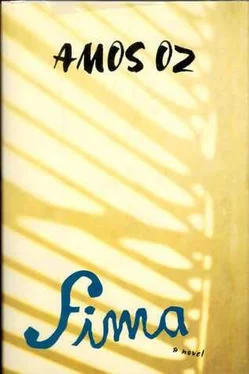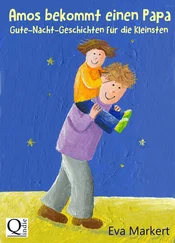His upsurge of fury yielded some benefit: as soon as he left the shop, he cut across a waste plot, entered an unfinished building, and barely had time to unzip his fly before his bladder emptied itself with a rush. He felt so triumphant that he did not even mind getting his shoes and trouser cuffs muddy. Proceeding northward, he walked past the bank without seeing it, but observed with excitement that the almond tree in his back garden was not the only one that had blossomed without waiting for the Trees' New Year. Although on second thought he was not sure about this, because he did not know the date according to the Jewish religious calendar. He could not even remember the secular date. At any rate, there was no doubt that it was only February and already spring was raising its head. Fima felt that there was a simple symbolism here: he did not ask himself what was symbolized, but he was happy. As though he had been given responsibility for the entire city, unasked, and to his surprise it turned out that he had not entirely failed in the discharge of his duties. The pale blue of the early morning had turned to a deep azure, as though the sea were suspended upside down over the city and were showering it with nursery-school cheerfulness. Geraniums and bougainvilleas blazed in front gardens. The low stone walls gleamed as though they were being caressed. "Not bad, eh?" Fima said mentally to an invisible guest or tourist.
At the turning to Bayit Vagan stood a young man in an army windbreaker, a submachine gun over his shoulder and surrounded by buckets of flowers. He suggested that Fima take a bunch of chrysanthemums for the weekend. Fima asked himself if this wasn't a settler from the Territories, who grew his flowers on other men's land. He immediately decided that someone who was prepared to make peace with Arafat should not excommunicate his own domestic opponents. Although he could see the argument for excommunicating. But he could find neither hatred nor anger in his heart, perhaps because of the radiant light. Jerusalem this morning seemed to be a place where all should respect the different opinions of others, and so he put his hand in his pocket and found three one-shekel coins, no doubt the change he had been given last night by his new minister of information. He pressed the flowers to his chest as though to protect them from the cold.
"Pardon?" said Fima. "Did you say something? I'm sorry, I didn't hear it."
The boy selling the flowers said with a broad smile:
"All I said was have a good weekend. Good Sabbath."
"Absolutely," Fima agreed, laying the foundations for a new national consensus. "Thank you. And a good weekend to you too."
The air was cold and vitreous, even though there was no wind. As though the light itself contained a dazzlingly clear arctic ingredient. The words "dazzlingly clear" afforded Fima a strange, secretive thrill. One must avoid malice, he thought, even when it disguises itself as principle. He ought to repeat to himself over and over that the real enemy was despair. It was vital not to compromise with despair, not to submit to it. Young Yoezer and his contemporaries, the moderate, reasonable people who will lead their carefully modulated lives here in Jerusalem after us, will be astonished at the suffering we brought on ourselves. But at least they won't remember us with contempt. We didn't give in without a struggle. We held on in Jerusalem as long as we could, against incomparably superior odds and stronger forces. We did not go under peacefully. And even if we were overcome in the end, we still have the advantage of Pascal's "thinking reed."
So it was that, excited, unkempt, and mud-spattered, at a quarter past ten in the morning, clutching a bunch of chrysanthemums and shivering with cold, Fima rang Ted and Yacl's doorbell. When Yael came to the door, wearing gray corduroy trousers and a burgundy sweater, he said to her without any embarrassment:
"I happened to be walking past and I decided to look in just for a minute, to wish you a good Sabbath. I hope I'm not disturbing you? Shall I come back tomorrow? I've got the painters in next week. Never mind. I brought you some flowers for the Sabbath. Can I come inside for a minute or two?"
28. IN ITHACA, ON THE WATER'S EDGE
"ALL RIGHT," SAID YAEL, "COME IN. JUST BEAR IN MIND THAT I'VE got to go out shortly. Hang on, let mc button your shirt properly. Tell me, when did you change it last?"
Fima said:
"You and I have to talk."
Yael said:
"Not again."
He followed her into the kitchen. On die way he peeked into the bedroom. He was vaguely hoping to see himself still sleeping in the bed since the night before last. But the bed had been made and spread with a dark blue woollen counterpane. On either side of it were twin lamps on matching bedside tables, and on each table a solitary book and, as in a hotel, a glass of water and a note pad and pencil. There were even identical alarm clocks.
Fima said:
"Dimi isn't well. We can't go on pretending there's nothing the matter with him. You'd better put the flowers in water; they're for you, for the Sabbath. I bought them from a settler. Besides which, it's your birthday around the end of February. You wouldn't make me a cup of coffee, would you? I've walked all the way from Kiryat Yovel and I'm half frozen to death. My upstairs neighbor tried to murder his wife at five this morning: I rushed upstairs to help and only made a fool of myself. Never mind. I've come to talk to you about Dimi. The other night, when you went out and I looked after him…"
"Look here, Efraim," Yael cut in, "why do you have to meddle in everybody's lives? I know Dimi isn't doing well. Or that we're not doing well with him. You're not telling me anything I don't know. You're not doing too well yourself, if it comes to that."
Fima understood from this that he ought to say good-bye and go. But he sat down on a low kitchen bench, looked up at Yael with doglike devotion, blinked his brown eyes, and started to explain that Dimi was an unhappy and dangerously lonely child. Something had come out the other evening while he was looking after the child, ho point in going into details, but he had formed the impression that the boy might be, how to put it, in need of some help.
Yael plugged the kettle in. She put instant coffee into two glasses. Fima had the feeling she was opening and closing more doors and drawers than was necessary. She said:
"Fine. Great. So you came to give me a lecture on childhood and its problems. Teddy's got this friend, a child psychologist from South Africa, and we consult him occasionally. So just stop looking for disasters and things to worry about. Stop pestering everybody."
When Yael mentioned South Africa, Fima had difficulty fighting back the sudden urge to explain his scenario about what was going to happen there in the near future, when the apartheid regime was toppled. He was convinced there would be a bloodbath, not just between whites and blacks, but also between whites and whites and blacks and blacks. Who could tell if a similar danger did not exist in Israel, too? But the word "bloodbath" struck him as a tired cliché.
Next to him on the kitchen table was an open package of butter biscuits. Unconsciously his fingers reached for it, and he started eating the biscuits one by one. While Yael passed him his white coffee, he described to her in a somewhat oblique way what had taken place two nights previously, and how he had come to fall asleep in her bed while Dimi was still awake at one in the morning. It wasn't very fair of you two, either, having a night out in Tel Aviv and not even bothering to leave an emergency phone number. Suppose the child had a bilious attack? Or electrocuted himself? Or poisoned himself? Fima got into a muddle because he did not want to give away, even indirectly, the business about the dog sacrifice. Nevertheless, he muttered something about the way the neighbors' children made Dimi's life a misery. "You know, Yael, he's not like the rest of them, he wears glasses, he's so serious, he's an albino, he's shortsighted, you could almost say he's half-blind, he's very small for his age, maybe on account of some hormonal disturbance that you ought to be doing something about, he's hypersensitive, he's an internal — no, that's not right — an introverted child — even that isn't exactly the right word — perhaps it's soulful or spiritual; it's hard to define. He's creative. Or, more accurately, he's an original, interesting, you might even say a deep child."
Читать дальше












